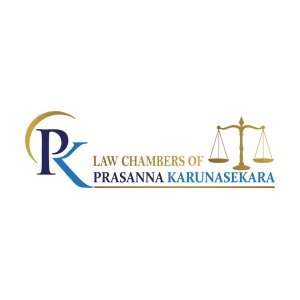Best Child Abuse Lawyers in Kiribathgoda
Share your needs with us, get contacted by law firms.
Free. Takes 2 min.
Free Guide to Hiring a Family Lawyer
List of the best lawyers in Kiribathgoda, Sri Lanka
About Child Abuse Law in Kiribathgoda, Sri Lanka
Child abuse is a serious issue that can have long-lasting effects on the well-being of children. In Kiribathgoda, Sri Lanka, there are laws in place to protect children from abuse and hold perpetrators accountable.
Why You May Need a Lawyer
When it comes to child abuse cases, legal representation is crucial to ensure that the rights of the child are protected and justice is served. Common situations where you may need a lawyer include:
- If you suspect or have evidence of child abuse and want to report it to the authorities.
- If you are a parent or guardian seeking legal protection for a child who has been subjected to abuse.
- If you are a child who has experienced abuse and need legal assistance to seek justice or protection.
- If you are accused of child abuse and need to defend yourself against false allegations.
Local Laws Overview
In Kiribathgoda, Sri Lanka, child abuse is primarily governed by the Protection of Child Rights Act and the Penal Code. The key aspects of local laws relevant to child abuse include:
- The Protection of Child Rights Act defines various forms of child abuse, including physical, sexual, emotional, and neglect.
- The Act outlines the reporting process for suspected cases of child abuse and sets penalties for offenders.
- The Penal Code provides criminal provisions for child abuse offenses, including punishment for perpetrators.
Frequently Asked Questions
Q: What should I do if I suspect a child is being abused?
A: If you suspect a child is being abused, it is important to report your concerns to the local authorities or child protection agencies. They have the resources to investigate the situation and take necessary actions to ensure the child's safety.
Q: What legal actions can be taken against child abusers?
A: Child abusers can face both criminal and civil consequences. Criminal actions may lead to imprisonment, fines, or rehabilitation programs. In civil cases, a child or their guardian may seek compensation for damages through a lawsuit.
Q: Are there legal protections for child abuse victims?
A: Yes, Kiribathgoda, Sri Lanka has legal provisions to protect child abuse victims. These include restraining orders, safe custody arrangements, and the appointment of legal guardians to act in the best interests of the child.
Q: Can I report child abuse anonymously?
A: Yes, you can report child abuse anonymously if you wish to protect your identity. However, providing your contact information may be helpful for follow-up investigations or to provide additional information if needed.
Q: Can child abuse cases be resolved outside of court?
A: In some cases, child abuse cases may be resolved through mediation or alternative dispute resolution methods. However, the nature and severity of the abuse will determine if court intervention is necessary to protect the rights and well-being of the child.
Additional Resources
If you need legal advice or assistance concerning child abuse in Kiribathgoda, Sri Lanka, consider reaching out to the following resources:
- Child Protection Authority of Sri Lanka - Website: www.childprotection.gov.lk
- National Child Protection Helpline - Hotline: 1929
- Legal Aid Commission of Sri Lanka - Website: www.legalaid.gov.lk
- Child Rights Organizations in Kiribathgoda
Next Steps
If you require legal assistance in a child abuse case in Kiribathgoda, Sri Lanka, it is recommended to:
- Document any evidence or incidents related to the abuse.
- Report the abuse to the local authorities or child protection agencies.
- Seek support from relevant organizations or helplines.
- Contact a qualified and experienced lawyer specializing in child abuse cases.
- Consult your lawyer to understand your rights and available legal options.
Lawzana helps you find the best lawyers and law firms in Kiribathgoda through a curated and pre-screened list of qualified legal professionals. Our platform offers rankings and detailed profiles of attorneys and law firms, allowing you to compare based on practice areas, including Child Abuse, experience, and client feedback.
Each profile includes a description of the firm's areas of practice, client reviews, team members and partners, year of establishment, spoken languages, office locations, contact information, social media presence, and any published articles or resources. Most firms on our platform speak English and are experienced in both local and international legal matters.
Get a quote from top-rated law firms in Kiribathgoda, Sri Lanka — quickly, securely, and without unnecessary hassle.
Disclaimer:
The information provided on this page is for general informational purposes only and does not constitute legal advice. While we strive to ensure the accuracy and relevance of the content, legal information may change over time, and interpretations of the law can vary. You should always consult with a qualified legal professional for advice specific to your situation.
We disclaim all liability for actions taken or not taken based on the content of this page. If you believe any information is incorrect or outdated, please contact us, and we will review and update it where appropriate.








